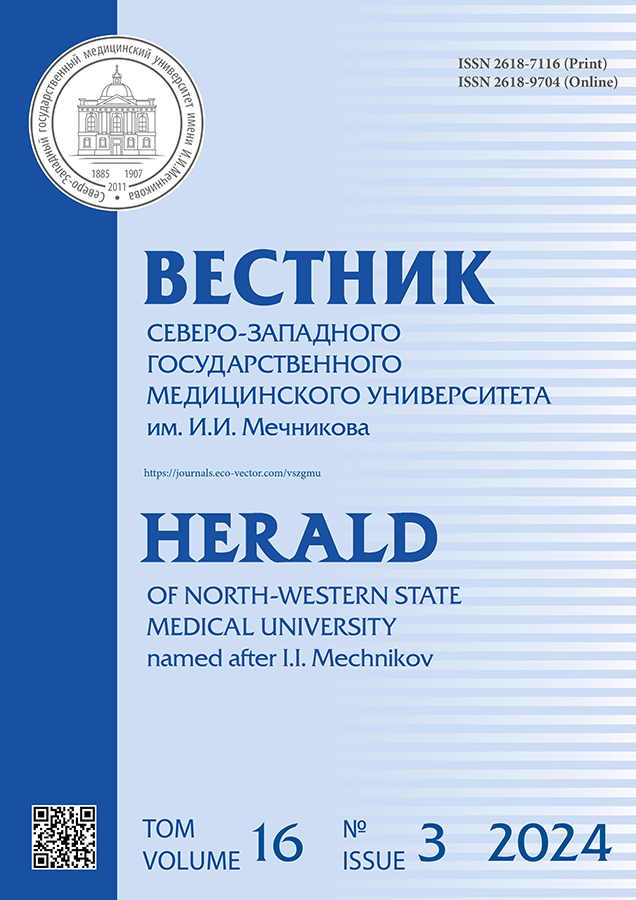Surgical aspects of treatment a patient with choledocholithiasis after gastropancreatoduodenectomy resection
- Authors: Sigua B.V.1, Kurkov A.A.1, Lataria E.L.1, Zakharov E.A.1, Tcelykovskaia O.B.1, Levchenko E.I.1, Zemlyanoy V.P.1
-
Affiliations:
- North-Western State Medical University named after I.I. Mechnikov
- Issue: Vol 16, No 3 (2024)
- Pages: 124-131
- Section: Case report
- Submitted: 21.02.2024
- Accepted: 24.04.2024
- Published: 07.11.2024
- URL: https://journals.eco-vector.com/vszgmu/article/view/625003
- DOI: https://doi.org/10.17816/mechnikov625003
- ID: 625003
Cite item
Abstract
Cholelithiasis is a common problem in surgery. The pathological basis of the disease is a imbalance between cholesterol, bilirubin and bile acid metabolism. There are several risk factors for cholelithiasis, both modifiable and non-modifiable. Complications of this pathology most often require surgical intervention: either planned or emergency. One of such complications is choledocholithiasis. Most often, choledocholithiasis occurs as a result of migration of stones from the gallbladder, less often of stones form in the bile ducts. In the world and Russian literature, many works are devoted to the etiology, pathogenesis and the treatment of patients with choledocholithiasis. The diagnosis is confirmed using advanced imaging methods, such as magnetic resonance cholangiopancreatography and endoscopic retrograde cholangiopancreatography. A widely used method of treatment is endoscopic retrograde cholangiopancreatography in combination with endoscopic papillosphincterotomy. However, in case of severe choledocholithiasis, including with an altered anatomical picture, standard methods do not always allow to achieve the desired result. This article describes a clinical case of successful treatment of a patient with choledocholithiasis that developed two years after gastropancreatoduodenal resection for adenocarcinoma of the major duodenal papilla.
Full Text
About the authors
Badri V. Sigua
North-Western State Medical University named after I.I. Mechnikov
Email: dr.sigua@gmail.com
ORCID iD: 0000-0002-4556-4913
SPIN-code: 5571-8893
MD, Dr. Sci. (Medicine), Professor
Russian Federation, Saint PetersburgAlexey A. Kurkov
North-Western State Medical University named after I.I. Mechnikov
Email: dok.kurkov@gmail.com
ORCID iD: 0000-0002-2128-8651
SPIN-code: 6396-4386
MD, Cand. Sci. (Medicine), Assistant
Russian Federation, Saint PetersburgElgudzha L. Lataria
North-Western State Medical University named after I.I. Mechnikov
Email: Elguja.Lataria@szgmu.ru
ORCID iD: 0000-0002-9569-8485
SPIN-code: 7376-9672
MD, Cand. Sci. (Medicine), Assistant Professor
Russian Federation, Saint PetersburgEvgeny A. Zakharov
North-Western State Medical University named after I.I. Mechnikov
Email: dr.zakharovea@gmail.com
ORCID iD: 0000-0002-2070-7420
SPIN-code: 2649-1050
MD, Cand. Sci. (Medicine)
Russian Federation, Saint PetersburgOlesia B. Tcelykovskaia
North-Western State Medical University named after I.I. Mechnikov
Author for correspondence.
Email: celykovskaya39@gmail.com
ORCID iD: 0000-0002-4151-2454
SPIN-code: 5030-4201
MD
Evgeny I. Levchenko
North-Western State Medical University named after I.I. Mechnikov
Email: lev2096@yandex.ru
MD
Russian Federation, Saint PetersburgVyacheslav P. Zemlyanoy
North-Western State Medical University named after I.I. Mechnikov
Email: yacheslav.zemlyanoy@szgmu.ru
ORCID iD: 0000-0001-7368-5926
MD, Dr. Sci. (Medicine), Professor, Honored Doctor of the Russian Federation
Russian Federation, Saint PetersburgReferences
- Manes G, Paspatis G, Aabakken L, et al. Endoscopic management of common bile duct stones: European Society of Gastrointestinal Endoscopy (ESGE) guideline. Endoscopy. 2019;51(5):472–491. doi: 10.1055/a-0862-0346
- Ko CW, Lee SP. Epidemiology and natural history of common bile duct stones and prediction of disease. Gastrointest Endosc. 2002;56(6 Suppl):S165–S169. doi: 10.1067/mge.2002.129005
- Li S, Guizzetti L, Ma C, et al. Epidemiology and outcomes of choledocholithiasis and cholangitis in the United States: trends and urban-rural variations. BMC Gastroenterol. 2023;23(1):254. doi: 10.1186/s12876-023-02868-3
- McNicoll CF, Pastorino A, Farooq U, et al. Choledocholithiasis. In: StatPearls [Internet]. Treasure Island (FL): StatPearls Publishing; 2024 Jan.
- Molvar C, Glaenzer B. Choledocholithiasis: evaluation, treatment, and outcomes. Semin Intervent Radiol. 2016;33(4):268–276. doi: 10.1055/s-0036-1592329
- Cianci P, Restini E. Management of cholelithiasis with choledocholithiasis: Endoscopic and surgical approaches. World J Gastroenterol. 2021;27(28):4536–4554. doi: 10.3748/wjg.v27.i28.4536
- Zhang J, Ling X. Risk factors and management of primary choledocholithiasis: a systematic review. ANZ J Surg. 2021;91(4):530–536. doi: 10.1111/ans.16211
- Saharia PC, Zuidema GD, Cameron JL. Primary common duct stones. Ann Surg. 1977;185(5):598–604. doi: 10.1097/00000658-197705000-00013
- Burdyukov MS, Nechipay AM. Choledocholithiasis: narrative review. Russian Journal of Evidence-Based Gastroenterology. 2020;9(4):55–66. EDN: EYROUS doi: 10.17116/dokgastro2020904155
- Cai JS, Qiang S, Bao-Bing Y. Advances of recurrent risk factors and management of choledocholithiasis. Scand J Gastroenterol. 2017;52(1):34–43. doi: 10.1080/00365521.2016.1224382
- Wu Y, Xu CJ, Xu SF. Advances in risk factors for recurrence of common bile duct stones. Int J Med Sci. 2021;18(4):1067–1074. doi: 10.7150/ijms.52974
- Ruiz Pardo J, García Marín A, Ruescas García FJ, et al. Differences between residual and primary choledocholithiasis in cholecystectomy patients. Rev Esp Enferm Dig. 2020;112(8):615–619. doi: 10.17235/reed.2020.6760/2019
- Zemlyanoy VP, Sigua BV, Gurzhiy DV, et al. Choledocholithiasis as a cause of obstructive jaundice after pancreatoduodenal resection. HERALD of the North-Western State Medical University named after I.I. Mechnikov. 2020;12(2):79–84. EDN: WSGCRZ doi: 10.17816/mechnikov202012279-84
Supplementary files











